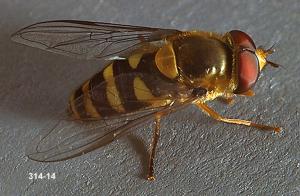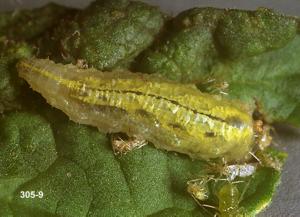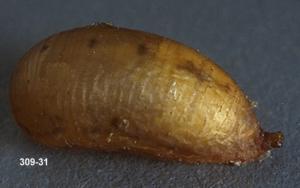Contents
Identification
Fact
Sheet (requires Acrobat Reader 3.x or
above to read and print. Click below to download the free "Reader".)

Registered
Insecticides
References
[Insect
Management]
[Home] |
|
 |
 |
| Syrphid Fly
Adult |
Syrphid Fly
Larva |
 |
 |
| Syrphid Fly
Adult |
Syrphid Fly
Larva |
 |
Adults are 10 to 12 mm
long, marked with yellow, black, or white bands. Adults feed only on pollen, nectar, and
honeydew. Larvae are about 12 mm long, wrinkled or slug-like in appearance, tappering to a
point at the head. They are usually brown or green with whitish areas. Eggs are chalky
white, with faint longitudinal ridges. Syrphids overwinter as pupae in the soil or above
ground in leaves and plant material. Adults emerge in May and June and lay eggs on leaves
and stems of plants infested with prey. Larvae feed for 7 to 10 days, then drop to the
soil to pupate. A life cycle is completed in 16 to 28 days and there are 3 to 7
overlapping generations each year. Syphid fly larvae feed on soft-bodied insects,
particularly aphids. As many as 400 aphids may be consumed by one larva during its
development. |
Syrphid
Fly Pupa |
View the Fact Sheet for More Information |
This section contains information on the
identification of syrphid fly predators. The Fact Sheet contains specific information on
identifcation and biology of these predators (requires Acrobat Reader). |





